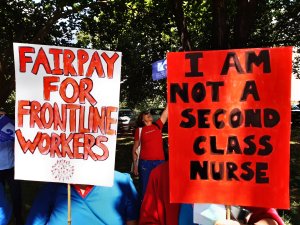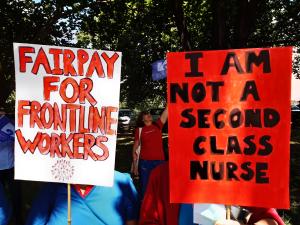Respiratory physician Lutz Beckert considers chronic obstructive pulmonary disease management, including the prevention of COPD, the importance of smoking cessation and pulmonary rehabilitation, and the lifesaving potential of addressing treatable traits. He also discusses the logic of inhaler therapy, moving from single therapy to dual and triple therapy when indicated, as well as other aspects of management
Rally for pay parity, practice nurses offered 2.78pc
Rally for pay parity, practice nurses offered 2.78pc

But 2.78 per cent doesn’t even cover last year’s Consumer Price Index let alone additional funding to fairly reward general practice nurses
Fed-up primary care nurses rallied across the country today asking the public to vote on the health minister’s performance on pay parity.
Practice nurses were joined by Plunket, urgent care, Māori provider and district nurse members of the New Zealand Nurses Organisation in lunchtime rallies planned for Auckland, Tauranga, Hamilton, Wellington and Christchurch.
The nurses were calling on health minister Andrew Little to ensure Te Whatu Ora – Health New Zealand urgently provides funds to close the 10 to 25 per cent gap between primary and Te Whatu Ora nurses.
Practice nurse pay talks lead delegate Denise Moore told the Christchurch rally primary care nurses were “leaving en masse” for Australia or Te Whatu Ora hospital jobs as they were “fed-up and frustrated” by the major pay gap.
The rallies follow last week’s first full day of practice-nurse pay talks since the demise of the NZMA, the former main employer advocate for the NZNO Primary Health Care multi-employer collective agreement (MECA).
NZNO primary care industrial advisor Danielle Davies says the now three employer bargaining parties have told the union they can afford only a 2.78 per cent offer.
Ms Davies says the union is putting the 2.78 per cent out to an informal “indicative” vote by the 3500 nurses and administrator members employed by the about 500 practices covered by the MECA. Ms Davies says she anticipates members will come back with a resounding “no” and a strong mandate to return to bargaining on 21 September.
That offer, based on the 2021/22 capitation increase, would leave a gap of about 8 per cent between the primary care MECA’s basic pay scale and the current Te Whatu Ora pay scale.
READ MORE:
- Caught off guard over pay talks - PHOs put hands up for nurse pay negotiations
- GenPro signs up practices for pay talks
- Officials' work on pay relativities 'accelerated': Andrew Little
- Looming $20,000 practice nurse pay gap: Minister says no quick solution
- Funding inequities preventing nurse pay deal, argue employers and union
- Practice nurse pay talks under way: Urgent meeting sought with minister
General Practice Owners Association (GenPro) chief executive Philip Grant says the bargaining parties had previously requested a meeting with Mr Little over the Government’s commitment to pay parity and the funding needed to support it.
Of the about 500 practices covered by the primary health care MECA, some 320 are represented by GenPro, just under 150 by the ProCare-led Primary Care Bargaining Collaborative, and 35 by Green Cross Health.
“I’ve heard a number of times from the minister that he’s committed to pay parity but he’s waiting for advice from his officials. That seems to be taking quite a long time,” says Mr Grant.
“And while he’s saying that, his [Te Whatu Ora] officials are saying to us the funding is already in general practice to pay for this.
“But 2.78 per cent doesn’t even cover last year’s Consumer Price Index let alone additional funding to fairly reward general practice nurses.”
Health minister Andrew Little, in an emailed response to New Zealand Doctor today, reiterated that dealing with the pay parity issue for nurses in primary care and aged care “remains my priority”.
“I recently received a proposal which was not acceptable as it did not move fast enough,” he says in the response. “I am working with other ministers on a resolution as quickly as possible with a view to providing certainty to parties in the coming months.”
Matt Prestwood, ProCare’s head of people and culture and part of the collaborative bargaining team, says it became clear that without increases in Government funding, all parties will not feasibly be able to achieve pay parity for nurses in primary care.
Mr Prestwood says lobbying and advocating with Te Whatu Ora will continue in hopes the September negotiations have a greater chance of agreement.
The primary health care MECA expired on 31 August last year. That short-term agreement was ratified in March 2021, after historic strike action in 2020 by practice nurse members. The MECA introduced a new basic pay step 6, but fell short of adding the step 7 that Te Whatu Ora nurses have.
Pay talks got under way late last year seeking parity, including adding the step 7, with the newly agreed NZNO DHB nursing pay agreement that widened the pay gap once again.
Mr Grant shared a letter written by GenPro to Te Whatu Ora strongly refuting that there is sufficient funding at present for general practice employers to introduce step 7.
A later and separate pay equity deal has been offered to Te Whatu Ora nurses but is currently stalled. That would stretch the pay gap out to $20,000 for experienced practice nurses at the top of the current basic pay scale.
We're publishing this article as a FREE READ so it is FREE to read and EASY to share more widely. Please support us and the hard work of our journalists by clicking here and subscribing to our publication and website











![Barbara Fountain, editor of New Zealand Doctor Rata Aotearoa, and Paul Hutchison, GP and senior medical clinician at Tāmaki Health [Image: Simon Maude]](/sites/default/files/styles/thumbnail_cropped_100/public/2025-03/Barbara%20Fountain%2C%20editor%20of%20New%20Zealand%20Doctor%20Rata%20Aotearoa%2C%20and%20Paul%20Hutchison%2C%20GP%20and%20senior%20medical%20clinician%20at%20T%C4%81maki%20Health%20CR%20Simon%20Maude.jpg?itok=-HbQ1EYA)
![Lori Peters, NP and advanced health improvement practitioner at Mahitahi Hauora, and Jasper Nacilla, NP at The Terrace Medical Centre in Wellington [Image: Simon Maude]](/sites/default/files/styles/thumbnail_cropped_100/public/2025-03/2.%20Lori%20Peters%2C%20NP%20and%20advanced%20HIP%20at%20Mahitahi%20Hauora%2C%20and%20Jasper%20Nacilla%2C%20NP%20at%20The%20Terrace%20Medical%20Centre%20in%20Wellington%20CR%20Simon%20Maude.jpg?itok=sUfbsSF1)
![Ministry of Social Development health and disability coordinator Liz Williams, regional health advisors Mary Mojel and Larah Takarangi, and health and disability coordinators Rebecca Staunton and Myint Than Htut [Image: Simon Maude]](/sites/default/files/styles/thumbnail_cropped_100/public/2025-03/3.%20Ministry%20of%20Social%20Development%27s%20Liz%20Williams%2C%20Mary%20Mojel%2C%20Larah%20Takarangi%2C%20Rebecca%20Staunton%20and%20Myint%20Than%20Htut%20CR%20Simon%20Maude.jpg?itok=9ceOujzC)
![Locum GP Helen Fisher, with Te Kuiti Medical Centre NP Bridget Woodney [Image: Simon Maude]](/sites/default/files/styles/thumbnail_cropped_100/public/2025-03/4.%20Locum%20GP%20Helen%20Fisher%2C%20with%20Te%20Kuiti%20Medical%20Centre%20NP%20Bridget%20Woodney%20CR%20Simon%20Maude.jpg?itok=TJeODetm)
![Ruby Faulkner, GPEP2, with David Small, GPEP3 from The Doctors Greenmeadows in Napier [Image: Simon Maude]](/sites/default/files/styles/thumbnail_cropped_100/public/2025-03/5.%20Ruby%20Faulkner%2C%20GPEP2%2C%20with%20David%20Small%2C%20GPEP3%20from%20The%20Doctors%20Greenmeadows%20in%20Napier%20CR%20Simon%20Maude.jpg?itok=B0u4wsIs)
![Rochelle Langton and Libby Thomas, marketing advisors at the Medical Protection Society [Image: Simon Maude]](/sites/default/files/styles/thumbnail_cropped_100/public/2025-03/6.%20Rochelle%20Langton%20and%20Libby%20Thomas%2C%20marketing%20advisors%20at%20the%20Medical%20Protection%20Society%20CR%20Simon%20Maude.jpg?itok=r52_Cf74)
![Specialist GP Lucy Gibberd, medical advisor at MPS, and Zara Bolam, urgent-care specialist at The Nest Health Centre in Inglewood [Image: Simon Maude]](/sites/default/files/styles/thumbnail_cropped_100/public/2025-03/7.%20Specialist%20GP%20Lucy%20Gibberd%2C%20medical%20advisor%20at%20MPS%2C%20and%20Zara%20Bolam%2C%20urgent-care%20specialist%20at%20The%20Nest%20Health%20Centre%20in%20Inglewood%20CR%20Simon%20Maude.jpg?itok=z8eVoBU3)
![Olivia Blackmore and Trudee Sharp, NPs at Gore Health Centre, and Gaylene Hastie, NP at Queenstown Medical Centre [Image: Simon Maude]](/sites/default/files/styles/thumbnail_cropped_100/public/2025-03/8.%20Olivia%20Blackmore%20and%20Trudee%20Sharp%2C%20NPs%20at%20Gore%20Health%20Centre%2C%20and%20Gaylene%20Hastie%2C%20NP%20at%20Queenstown%20Medical%20Centre%20CR%20Simon%20Maude.jpg?itok=Z6u9d0XH)
![Mary Toloa, specialist GP at Porirua and Union Community Health Service in Wellington, Mara Coler, clinical pharmacist at Tū Ora Compass Health, and Bhavna Mistry, specialist GP at Porirua and Union Community Health Service [Image: Simon Maude]](/sites/default/files/styles/thumbnail_cropped_100/public/2025-03/9.%20Mary%20Toloa%2C%20Porirua%20and%20Union%20Community%20Health%20Service%20in%20Wellington%2C%20Mara%20Coler%2C%20T%C5%AB%20Ora%20Compass%20Health%2C%20and%20Bhavna%20Mistry%2C%20PUCHS%20CR%20Simon%20Maude.jpg?itok=kpChr0cc)